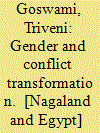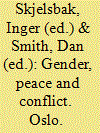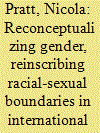|
|
|
Sort Order |
|
|
|
Items / Page
|
|
|
|
|
|
|
| Srl | Item |
| 1 |
ID:
079437


|
|
|
|
|
| Publication |
New Delhi, Akansha Publishing House, 2007.
|
| Description |
xiv, 140
|
| Standard Number |
9788183701198
|
|
|
|
|
|
|
|
|
|
|
|
Copies: C:1/I:0,R:0,Q:0
Circulation
| Accession# | Call# | Current Location | Status | Policy | Location |
| 052828 | 303.60954165/GOS 052828 | Main | On Shelf | General | |
|
|
|
|
| 2 |
ID:
067711


|
|
|
|
|
| Publication |
Washington, D C, The World Bank, 2005.
|
| Description |
xxviii, 192p.
|
| Standard Number |
0821359681
|
|
|
|
|
|
|
|
|
|
|
|
Copies: C:1/I:0,R:0,Q:0
Circulation
| Accession# | Call# | Current Location | Status | Policy | Location |
| 050642 | 305.42091724/BOU 050642 | Main | On Shelf | General | |
|
|
|
|
| 3 |
ID:
049315


|
|
|
|
|
| Publication |
Oslo, International peace research Institute, 2001.
|
| Description |
x, 228p.
|
| Standard Number |
0761968539
|
|
|
|
|
|
|
|
|
|
|
|
Copies: C:1/I:0,R:0,Q:0
Circulation
| Accession# | Call# | Current Location | Status | Policy | Location |
| 045379 | 305.3/SKJ 045379 | Main | On Shelf | General | |
|
|
|
|
| 4 |
ID:
126571


|
|
|
|
|
| Publication |
2013.
|
| Summary/Abstract |
The gendered boundaries of international security, historically identified by feminist scholarship, are being broken down since the passage of UN Security Council Resolution 1325, which calls on member states to mainstream a gender perspective into matters of conflict and peacebuilding. However, we should not read this as a positive step toward the transformation of the lives of women (and men) in conflict zones. Reading 1325 and subsequent resolutions through a postcolonial feminist lens reveals that this reconceptualization of gender occurs through a reinscription of racial-sexual boundaries, evocative of the political economy of imperialism. An examination of the discourses and practices of the "war on terror" exposes a similar configuration of gender, race, and sexuality. I argue that 1325 works in tandem with dominant security practices and discourses in the post-9/11 moment, normalizing the violence of counterterrorism and counterinsurgency measures. Understanding the significance of race and sexuality in the conceptualization of gender has implications for transnational feminist praxis and its ability to construct a counter-hegemonic project to transform the dominant structures of power that give rise to war, conflict, insecurity, and injustice.
|
|
|
|
|
|
|
|
|
|
|
|
|
|
|
|
|
|
|
|
|